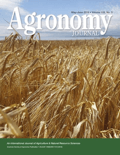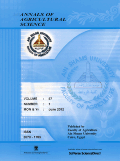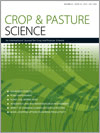
Agronomy-Basel
Scope & Guideline
Advancing Agricultural Practices Through Open Access Research
Introduction
Aims and Scopes
- Sustainable Agriculture Practices:
Exploration of methods that enhance crop yield while minimizing environmental impact, including organic farming, agroecological approaches, and integrated pest management. - Crop Genetics and Breeding:
Research on genetic improvements, including genome-wide association studies, marker-assisted selection, and the development of resilient crop varieties to adapt to climate change. - Soil and Water Management:
Studies aimed at optimizing soil health and water use efficiency, focusing on irrigation techniques, soil amendments, and nutrient management strategies. - Plant Physiology and Biochemistry:
Investigations into the physiological responses of crops to various stressors (abiotic and biotic), including drought, salinity, and nutrient deficiencies, and their impact on crop quality and yield. - Technological Innovations in Agriculture:
Application of advanced technologies such as remote sensing, machine learning, and robotics for precision farming and enhanced crop management. - Ecological Interactions and Biodiversity:
Research on plant-microbe interactions, biodiversity in agricultural systems, and the role of cover crops in enhancing soil and ecosystem health. - Climate Change Impact Assessment:
Evaluating the effects of climate variability on agricultural productivity, crop resilience, and adaptation strategies to mitigate adverse effects.
Trending and Emerging
- Precision Agriculture and Smart Farming:
There is a growing emphasis on using technology such as UAVs, machine learning, and sensor networks to optimize agricultural practices and improve yields. - Climate-Smart Agriculture:
Research increasingly focuses on strategies that enhance agricultural resilience to climate change, including drought-resistant varieties and sustainable water management practices. - Biostimulants and Organic Amendments:
The use of organic amendments and biostimulants to enhance soil fertility and plant growth is gaining traction, showcasing a shift towards sustainable agricultural inputs. - Microbial Interactions and Soil Health:
There is an increasing interest in the role of soil microbiomes and their interactions with plants, particularly in the context of sustainable farming and soil health. - Genomic and Transcriptomic Studies:
Emerging research in genomics and transcriptomics is being applied to understand plant responses to environmental stresses and to identify traits associated with resilience and productivity. - Sustainable Pest and Disease Management:
Research is trending towards integrated approaches that combine biological control, cultural practices, and resistant crop varieties to manage pests and diseases sustainably.
Declining or Waning
- Traditional Chemical Fertilization:
There is a noticeable decrease in research focusing solely on conventional chemical fertilizers, as there is a shift towards integrated nutrient management and organic alternatives. - Single Crop Systems:
The exploration of monoculture systems is diminishing in favor of intercropping and polyculture practices that promote biodiversity and resilience. - Basic Pest Control Methods:
Research centered around traditional pest control methods without considering integrated pest management is becoming less common, as more emphasis is placed on sustainable and ecological approaches. - Static Agricultural Practices:
The focus on static, non-adaptive agricultural practices is waning, with increasing interest in dynamic and responsive agricultural systems that can adapt to changing environmental conditions.
Similar Journals

Pesquisa Agropecuaria Tropical
Advancing agricultural knowledge for a sustainable future.pesquisa Agropecuaria Tropical is a premier Open Access journal dedicated to advancing the knowledge and practices within the field of agronomy and crop science. Since its inception in 1971, this peer-reviewed journal, published by the Universidade Federal de Goiás, has played a pivotal role in disseminating high-quality research from Brazil and beyond. Operating under an Open Access model, it ensures that scholarly articles are freely accessible, thereby fostering greater collaboration and innovation. With a Scopus ranking placing it in the 32nd percentile among its peers in agricultural and biological sciences, and a current classification in the Q3 category of agronomy and crop science, the journal serves as an essential resource for researchers, professionals, and students alike. As it continues its publication journey from 2010 to 2024, it remains committed to contributing valuable insights and advancements in the agricultural sector, ultimately influencing sustainable practices and food security.

AGRONOMY JOURNAL
Shaping the Future of Crop Science with Quality LiteratureThe Agronomy Journal, published by Wiley, is a leading platform for cutting-edge research in the field of agronomy and crop science. Established in the United States, this prestigious journal carries the ISSN 0002-1962 and E-ISSN 1435-0645, with its coverage spanning from 1976 to 2024, showcasing a wealth of knowledge over decades. The journal is recognized in the top quartile (Q1) of its category, making it a highly respected source for quality literature, ranking #108 out of 406 in the Scopus database and reflecting a 73rd percentile standing in agricultural and biological sciences. While it operates under traditional access options, its commitment to disseminating valuable scientific inquiry aligns with the objectives of advancing sustainable agricultural practices globally. The Agronomy Journal serves as an indispensable resource for researchers, professionals, and students eager to stay abreast of significant advancements and discussions influencing the future of crop science and agronomic research.

International Journal of Agriculture and Natural Resources
Exploring Solutions for Global Agricultural ChallengesInternational Journal of Agriculture and Natural Resources is a premier academic journal published by the Pontificia Universidad Católica de Chile, Facultad de Agronomía e Ingeniería Forestal. With an ISSN of 2452-5731 and an e-ISSN of the same, this journal operates as an Open Access publication, allowing for the widespread dissemination of research findings pertinent to the fields of agriculture and natural resources. As of 2023, it holds a commendable Q2 ranking in Agricultural and Biological Sciences, indicating its significant contribution to the field. The journal's objective is to provide a platform for innovative research and in-depth analyses on emerging trends and challenges within agriculture, promoting sustainability and ecological balance. Covering a broad spectrum of topics, it aims to foster dialogue among researchers, professionals, and students, ultimately enhancing knowledge and fostering collaboration. With a current Scopus rank of #93 out of 221 in the general agricultural and biological sciences category, it occupies a vital role in advancing research and practices in agriculture and related disciplines.

International Journal of Plant Production
Advancing sustainable agriculture through innovative research.International Journal of Plant Production, published by SPRINGER in Switzerland, serves as a leading platform for the dissemination of innovative research in the fields of Agronomy, Crop Science, and Plant Science. With an ISSN of 1735-6814 and an E-ISSN of 1735-8043, this journal has maintained its reputation by achieving a Q2 quartile ranking in both categories as of 2023, alongside notable Scopus rankings placing it in the top quartiles of its fields (Rank #105/516 and Rank #88/406, respectively). The journal's scope encompasses a wide array of topics vital to sustainable agriculture and plant production systems, making it a critical resource for researchers, professionals, and students striving for advancements in these disciplines. By fostering open scientific dialogue and supporting cutting-edge research, the International Journal of Plant Production is committed to contributing to the resolution of global food security challenges, enhancing agricultural practices, and promoting ecological sustainability.

CROP SCIENCE
Exploring the future of crop science for a sustainable world.CROP SCIENCE, published by WILEY, is a premier journal dedicated to the field of agronomy and crop science, offering a platform for high-quality research on crop production, genetics, and sustainable agricultural practices. With an impactful presence since its inception in 1974, the journal has become a significant contributor to advancing knowledge in this critical field, as evidenced by its Q2 ranking in the 2023 categorizations and a Scopus rank in the 72nd percentile among its peers. The journal's aim is to disseminate innovative research findings that inform best practices and policies for enhancing crop yield and sustainability, making it an essential resource for researchers, professionals, and students alike. Although CROP SCIENCE does not currently offer open access options, the journal’s extensive readership and reputation make it a valuable asset for anyone invested in the future of agriculture.

Frontiers in Agronomy
Elevating Agronomy with Open Access ResearchFrontiers in Agronomy, published by FRONTIERS MEDIA SA, is a premier open-access journal dedicated to the dynamic field of agronomy. Launched in 2019, it has rapidly established itself as a leader in the publication of groundbreaking research, holding a distinguished Q1 ranking in several categories including Agricultural and Biological Sciences, Agronomy and Crop Science, Plant Science, and Soil Science as of 2023. With an impressive Scopus ranking that positions it among the top journals in its field, this journal provides a valuable platform for researchers, professionals, and students alike to disseminate and access innovative research and critical insights in agronomy. Every contribution to Frontiers in Agronomy undergoes rigorous peer review, ensuring that high-quality research remains at its core. Accessible to all since its inception, it serves as a vital resource for advancing knowledge and fostering collaboration within the global agronomic community, supporting the quest for sustainable agricultural practices and enhanced crop productivity.

ANNALS OF AGRICULTURAL SCIENCES
Transforming Agricultural Science into Practical SolutionsANNALS OF AGRICULTURAL SCIENCES, published by Elsevier, stands as a leading open access journal dedicated to the multifaceted field of agricultural sciences. Since its inception in 2011, this journal has served as a pivotal platform for the dissemination of high-quality research, covering areas such as agronomy, animal science, horticulture, food science, plant science, and soil science. With an impressive Q1 ranking across multiple disciplines and notable positions in Scopus Ranks—including #6 in Animal Science and Zoology and #3 in Horticulture—this journal is recognized globally for its significant contribution to advancing agricultural innovations. The journal caters to a diverse audience of researchers, professionals, and students, providing them with open access to cutting-edge studies that address critical issues in agricultural productivity and sustainability. Its commitment to high-impact research ensures that articles contribute meaningfully to the scientific community, fostering advancements in agricultural practices and policies.

Agrociencia Uruguay
Empowering Research, Cultivating InnovationAgrociencia Uruguay, published by the Universidad de la República, Facultad de Agronomía, serves as a vital academic platform in the field of agricultural and biological sciences. Since its inception in 1997, this Open Access journal has fostered the dissemination of innovative research findings, promoting collaboration among researchers, professionals, and students interested in agronomy, crop science, soil science, and plant science. Operating from Montevideo, Uruguay, the journal strives to address contemporary challenges in agriculture through the publication of high-quality, peer-reviewed articles. Despite its relatively modest impact factors and rankings in Scopus, positioned in the lower percentiles, Agrociencia Uruguay remains crucial for advancing local and regional agricultural knowledge, thus contributing to global food security and sustainable practices. Researchers are encouraged to engage with the journal's content to further enhance their understanding and explore the rich agricultural landscape of Uruguay and beyond.

CANADIAN JOURNAL OF PLANT SCIENCE
Transforming Agricultural Insights into ActionCanadian Journal of Plant Science (ISSN: 0008-4220, E-ISSN: 1918-1833) is a prestigious publication dedicated to advancing research in the fields of agronomy, horticulture, and plant science. Published by Canadian Science Publishing, this journal has been a cornerstone in the Canadian and international scientific community since its inception in 1973. With a solid presence in reputable databases, it ranks in the Q3 category for multiple disciplines as of 2023, reflecting its impact and relevance within the agricultural sciences. The journal serves as a vital resource for researchers, professionals, and students, encouraging the dissemination of innovative findings and fostering collaboration across disciplines. Although it is not an open-access journal, subscribers gain exclusive access to a wealth of knowledge, with articles aiming to enhance the understanding of plant systems and contribute to sustainable agricultural practices. The Canadian Journal of Plant Science remains committed to supporting the growth of plant-related research and its practical applications in today's changing environmental landscape.

Crop & Pasture Science
Exploring the intersection of agronomy and sustainability.Crop & Pasture Science is a leading journal published by CSIRO PUBLISHING, focusing on the critical fields of agronomy, crop science, and plant science. With an impressive Q2 ranking in both categories as of 2023, this journal plays a vital role in disseminating high-quality research that addresses the challenges in sustainable agriculture and food security. Featuring full open-access options, Crop & Pasture Science ensures your research reaches a wide audience, fostering collaboration and innovation among ecologists, agronomists, and plant scientists. With a steady record of contributions since its establishment and a convergence of knowledge from 2009 to 2024, this journal stands at the forefront of the agricultural sciences, providing a robust platform for the latest advancements and discoveries. Located in Australia, the journal serves a global community, making it an essential resource for anyone invested in the future of agriculture and environmental sustainability.